The enigmas and the history of the most famous painting in the world. Analysis of: "Mona Lisa" by Leonardo Da Vinci
| Author | Leonardo Da Vinci |
|---|---|
| Date | 1503-1519 |
| Technique | Oil on poplar panel |
| Style | Renaissance |
| Dimensions | 30 in × 21 in |
| Location | Louvre Museum, Paris. |
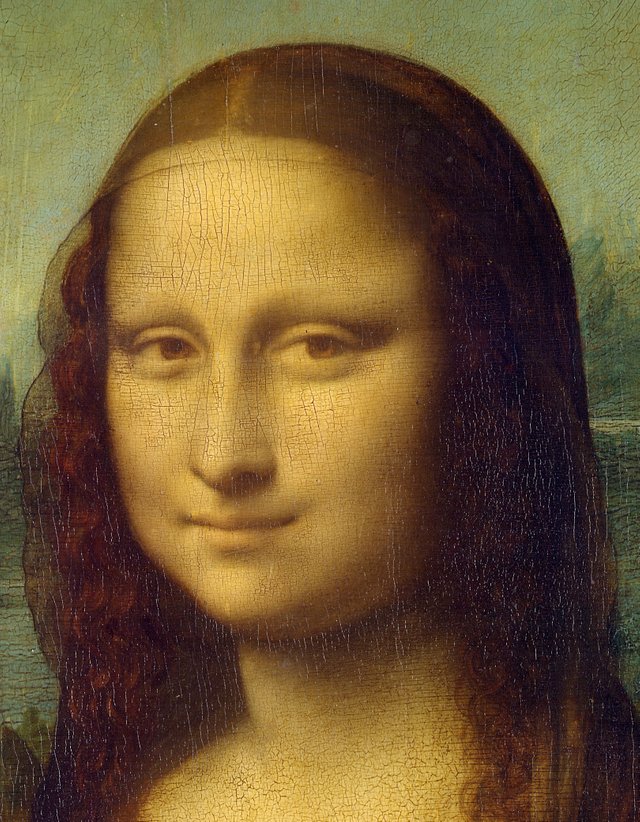
Context
The Mona Lisa is one of the works that has most influenced the history of art, perhaps because of the naturalness and the detail with which it was painted, for that mysterious look that seems to haunt us, or perhaps because of the enigmatic smile that characterizes it. It’s definitely a work worthy of admiration, which is not surprising since it was painted by one of the most brilliant minds of humanity.
Leonardo Da Vinci was an extraordinary Italian scientist and artist. He was born in Vinci, Italy in 1452 and died in Amboise, France in 1519. He is considered a universal humanist and is the most important figure of the Renaissance.
Before being completed, the painting was retouched several times by Leonardo, he took it to Rome and then to France, where he kept it until he died at his residence in Clos-Lucé. Then it was owned by the French king Francis I, who paid a large amount of money for it. After the death of Francis I, the work went to Fontainebleau, and then to the Palace of Versailles.
After the French Revolution it arrived at the Louvre Museum in 1797. Three years later Napoleon ordered that the painting should be placed in his bedroom at the Tuileries Palace but he returned it to Louvre in 1804 where it remains today.
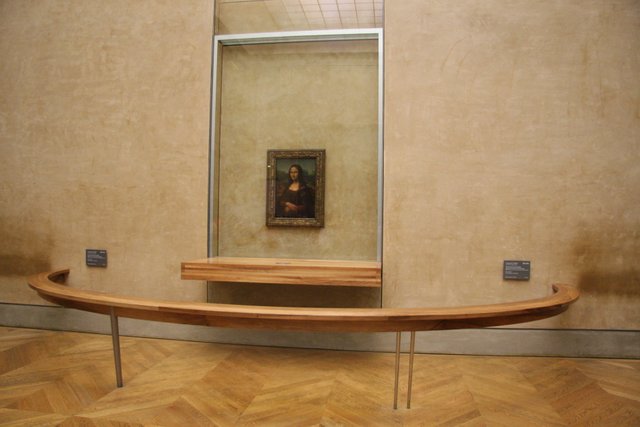
Origin
There is not yet a full consensus on the identity of the model. The most accepted story was written by Giorgio Vasari, who states that she is Lisa Gherardini, the wife of a merchant named Francesco del Giocondo.
But there are other theories about who could be the protagonist of the painting. Some people say that is the Spanish Constanza de Avalos, others that she is a lover of Juliano de Medici and even that is a self-portrait of Leonardo.
"Mona Lisa" means "Mrs. Lisa", being a diminutive of madonna, and Lisa is the model's name. It is also known as La Gioconda, which means "the happy one", referring to her smile and perhaps to her husband's last name.
How did this painting become famous?
The fame of this painting is not based exclusively on the technique used or its beauty, but also on the mysteries that surround it, at the beginning of the 20th century the painting was quite recognized, but not at current levels, it became popular for a lot of people in 1911 with the massive coverage of his theft. The controversy was so big that Picasso was accused of being the thief. Finally, the painting was recovered 2 years later; the thief was a former Italian employee of the Louvre Museum named Vincenzo Peruggia.
Along with the mysteries surrounding the painting, the immense number of reproductions made, the multiple works of art that have been inspired by the painting and the existing parodies make La Gioconda the most famous painting in the world.
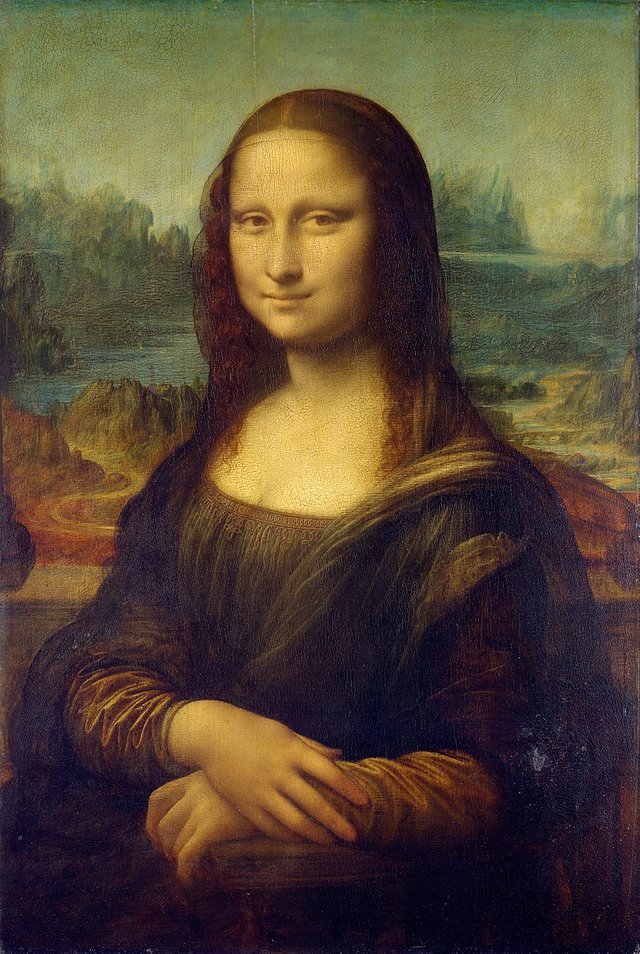
Analysis
Leonardo made Mona Lisa break many traditions in painting. The woman looks directly at the viewer and smiles at him with certainty, both attitudes were typical of aristocratic men, not women.
Giorgio Vasari, the most reliable source of information we have about the painting, tells us the following:
The eyes of Mona Lisa have a lustrous brilliance and the nuances of the figure are made in pale colors ... The eyelashes and eyebrows are perfectly designed, which implies a great technique and a lot of difficulty ... The nose is beautiful...
But the model lacks eyebrows and eyelashes, possibly for a very aggressive restoration in past centuries, in which the glazes would have been eliminated.
Her straight and upright posture represents serenity, in addition her direct gaze towards the spectator shows the dominance of feelings, something considered very uncommon in a woman of her time. This posture is derived from the pyramid used to represent seated madonnas, with her hands being the basis of it. His left arm is supported on the arm of the chair and is crossed by the right arm. The position of the arms transmit a feeling of distance between her and the viewer.
She is covered by a veil that symbolizes chastity, quite common in portraits of wives, her clothing is discreet and simple, we can appreciate the absence of jewelry, this is so that the attention of the viewer focuses exclusively on his smile.
The expression on the woman's face is enigmatic. There is a kind of ambiguity in its expression. This could be because the eyes, body and hands are directed at different angles.
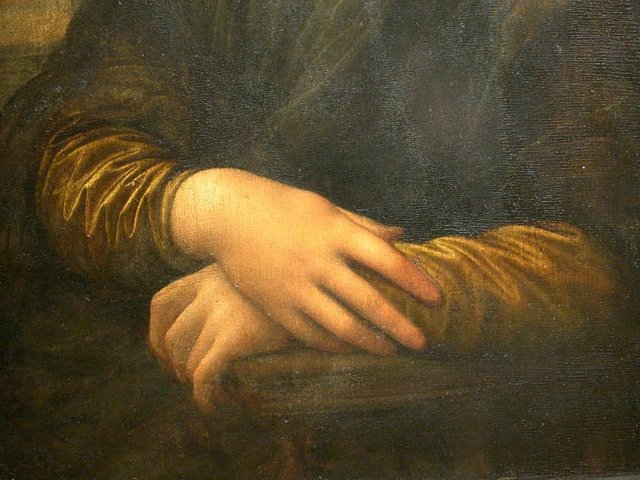
The landscape, in the background, shows a certain imbalance since it seems to be divided into two, each half quite different from the other. It dominates a smoky blue on top, the unclear and diffuse perspective helps to give a greater depth to the painting.
Another aspect that impresses is the naturalness of the work. The brightness of her eyes, the transparency of her skin, the meticulousness with which her hair was painted and the details of her face; give the Mona Lisa an aura of naturalness. In addition, the way in which the figure is involved with the landscape and the play of lights and shadows are spectacular. The sum of all this results in this masterpiece.
Technique
The combination of aerial perspective and the technique of sfumato achieve a three-dimensional sensation and depth. The sfumato consists of diluting the oil and applying it in very thin layers, blurring the lines and softening the contours.
Da Vinci uses ocher colors for dark shades and sulfurous yellow for the skin. In the landscape uses black, shades of brown and blue tones, blurring the color to accentuate the remoteness and proximity of the landscape, which is perceived but not determined.
It makes a somber use of light in both the portrait and the landscape. The light comes from the bottom and is materialized in the transparency of the veil, in the folds of the dress, a part of the hair and intensifies in the face and hands.
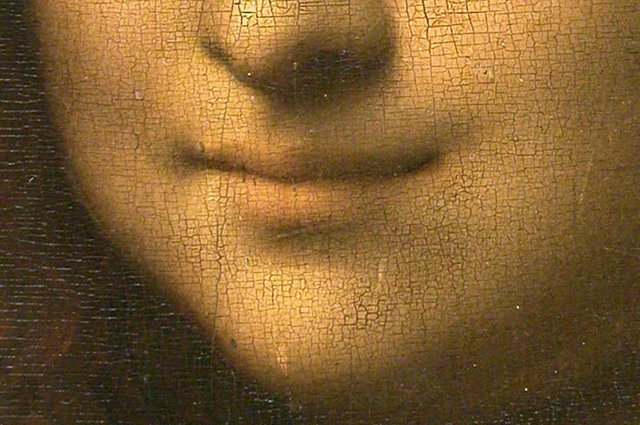
The explanation about the mystery of the smile and the gaze of Mona Lisa lies in the technique of sfumato and the nature of human vision.
The thin and diffused layers of the sfumato make that when looking directly at the front we can see a little marked smile compared to the one that appears when we see it on side. This happens because more volume is projected from the side due to the shadows created by the thin layers. Human direct vision focuses more on details than on shadows, instead, our peripheral vision distinguishes shadows more than details.
The technique of composition of the Mona Lisa makes this one of the most studied works in the history of art and by novice artists. Some say they feel the impression of being constantly observed by the Mona Lisa, from any position in which she is looked at.
Curiosities
Vasari says in his writings that while Leonardo painted the Mona Lisa there was always someone singing, or telling her a story and that way he got the expression on his face.
The official title of the work, according to the Louvre Museum, is Portrait of Lisa Gherardini, wife of Francesco del Giocondo, although the painting is better known as La Gioconda or Mona Lisa.
Images extracted from Wikipedia
My recent posts
Review of "Liberty leading the people" by Eugene Delacroix
Review of "The school of Athens" by Raphael
Review of "The persistence of memory" by Salvador Dali
Review of "The birth of Venus" by Sandro Botticelli
Review of "The creation of Adam" by Michelangelo
Aunque la mona lisa es muy famosa yo diría que lo que le dio la fama es el misterio que gira a su alrededor. Como opinión personal diría que existen obras que deberian tener igual o mas relevancia. En cuanto a tu post esta muy bien desarrollado y cada detalle bien explicado, me parece muy creativo. Felicidades.
Gracias por tu comentario. Estoy de acuerdo contigo, hay obras que a veces se ganan su fama por otros motivos más que por lo que representan por si mismas. La Mona Lisa no es la excepción, tenemos tantas dudas sobre ella, por ejemplo, si era un retrato ¿por que Da Vinci se lo llevó a Francia en vez de entregárselo a los que se lo encargaron? o ¿por que la seguia retocando hasta los últimos años de su vida?.
Es interesante pensar que tal vez esta pintura sería una más de muchas si no estuviera envuelta de tanto misterio como mencionaste.
You got a 44.34% upvote from @emperorofnaps courtesy of @alejandromata!
Want to promote your posts too? Send 0.05+ SBD or STEEM to @emperorofnaps to receive a share of a full upvote every 2.4 hours...Then go relax and take a nap!
Congratulations! This post has been upvoted from the communal account, @minnowsupport, by alejandromata from the Minnow Support Project. It's a witness project run by aggroed, ausbitbank, teamsteem, theprophet0, someguy123, neoxian, followbtcnews, and netuoso. The goal is to help Steemit grow by supporting Minnows. Please find us at the Peace, Abundance, and Liberty Network (PALnet) Discord Channel. It's a completely public and open space to all members of the Steemit community who voluntarily choose to be there.
If you would like to delegate to the Minnow Support Project you can do so by clicking on the following links: 50SP, 100SP, 250SP, 500SP, 1000SP, 5000SP.
Be sure to leave at least 50SP undelegated on your account.
Congratulations @alejandromata! You have completed some achievement on Steemit and have been rewarded with new badge(s) :
Click on any badge to view your own Board of Honor on SteemitBoard.
For more information about SteemitBoard, click here
If you no longer want to receive notifications, reply to this comment with the word
STOPThanks for your support!
This post has received a 4.49 % upvote from @boomerang.
You got a 1.54% upvote from @postpromoter courtesy of @alejandromata!
Want to promote your posts too? Check out the Steem Bot Tracker website for more info. If you would like to support the development of @postpromoter and the bot tracker please vote for @yabapmatt for witness!